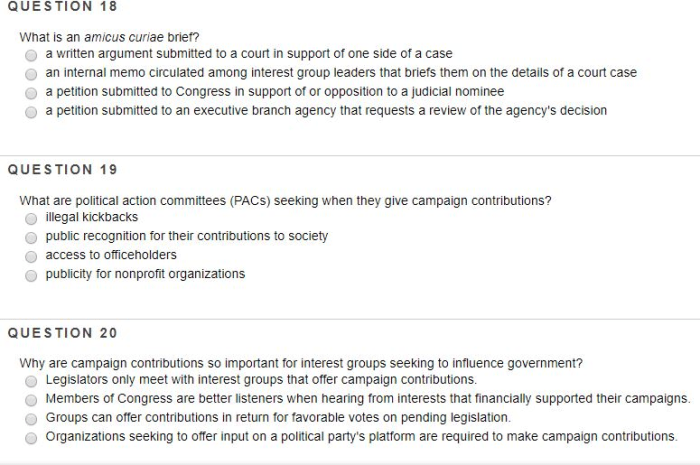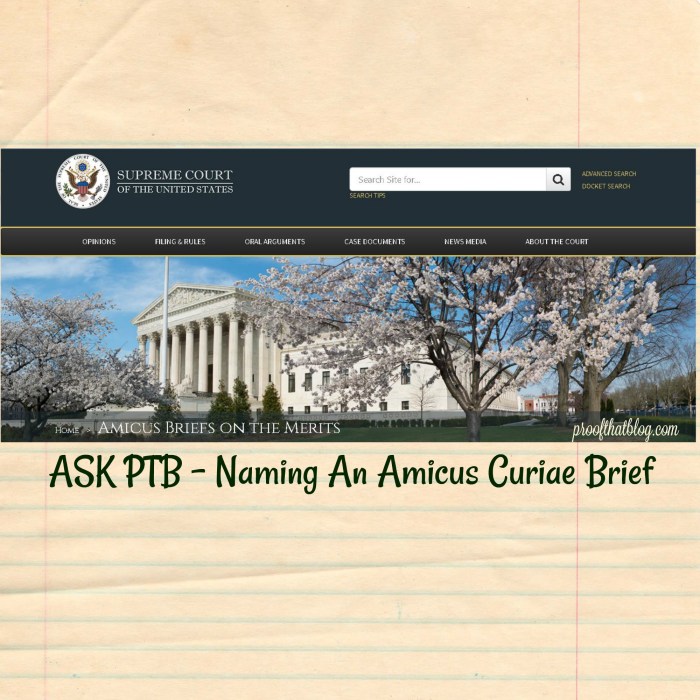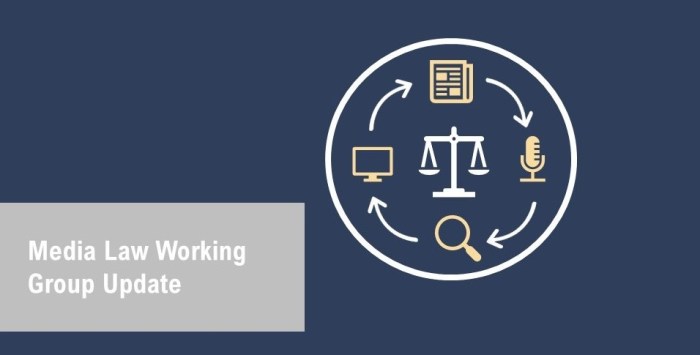Amicus curiae brief ap gov – In the realm of law, amicus curiae briefs hold a unique place, providing valuable insights and perspectives to courts. This guide delves into the world of amicus curiae briefs ap gov, exploring their significance, process, and impact on the American legal landscape.
These briefs, filed by individuals or organizations not directly involved in a case, offer expert opinions, additional information, and legal arguments to assist judges in making informed decisions.
Introduction

Amicus curiae briefs, also known as “friend of the court” briefs, are legal documents submitted to a court by individuals or organizations who are not directly involved in a case but have an interest in its outcome.
These briefs provide the court with additional perspectives and information that may not have been considered by the parties directly involved. Amicus curiae briefs play a vital role in the US legal system by ensuring that all relevant viewpoints are represented in court proceedings.
Notable Amicus Curiae Briefs
Throughout history, several notable amicus curiae briefs have had a significant impact on the outcome of important cases.
- In Brown v. Board of Education(1954), the NAACP submitted an amicus curiae brief that provided extensive evidence of the harmful effects of school segregation on African American children.
- In Roe v. Wade(1973), a group of doctors filed an amicus curiae brief arguing that the right to privacy includes the right to an abortion.
- In Obergefell v. Hodges(2015), several same-sex couples submitted amicus curiae briefs supporting the legalization of same-sex marriage.
The Process of Filing an Amicus Curiae Brief

An amicus curiae brief is a document filed with the court by an individual or organization that is not a party to the case. It provides the court with information and arguments that may assist in deciding the case.
Who Can File an Amicus Curiae Brief
Anyone can file an amicus curiae brief, but the court is more likely to consider briefs from organizations or individuals with expertise in the area of law that is relevant to the case.
Requirements for Filing an Amicus Curiae Brief
Amicus curiae briefs must meet certain requirements, including:
- They must be filed within a certain time frame, as set by the court.
- They must be no more than a certain number of pages in length.
- They must be signed by an attorney.
Steps Involved in Filing an Amicus Curiae Brief
The steps involved in filing an amicus curiae brief include:
- Researching the case and identifying the legal issues that are involved.
- Drafting the brief, which should include arguments and evidence to support the position that the amicus curiae is taking.
- Filing the brief with the court.
- Serving the brief on the parties to the case.
The Impact of Amicus Curiae Briefs

Amicus curiae briefs have the potential to significantly impact court decisions by providing additional perspectives, expertise, and information that the court may not otherwise have access to. These briefs can influence outcomes by:
-
-*Providing New Evidence or Arguments
Understanding amicus curiae briefs in AP Government is crucial. But hey, if you need a quick reference while studying for your AP Physics 1 exam, check out this handy ap physics 1 cheat sheet . It’s like a cheat code for the laws of motion and energy! Returning to amicus curiae briefs, these legal documents provide additional perspectives to the court, helping judges make informed decisions.
Amicus briefs can present new evidence or legal arguments that support or challenge the positions of the parties involved in the case. This can help the court to better understand the issues at hand and make more informed decisions.
-*Raising Awareness of Important Issues
Amicus briefs can raise awareness of important social, political, or legal issues that may not be fully considered by the court. This can help to ensure that the court takes these issues into account when making its decision.
-*Influencing Public Opinion
Amicus briefs can influence public opinion on a particular case or issue. This can put pressure on the court to rule in a certain way or to consider the views of the public.
Examples of Amicus Curiae Briefs Influencing Outcomes
There have been numerous cases where amicus curiae briefs have influenced the outcome of court decisions. For example, in the landmark case of Brown v. Board of Education, several amicus briefs were filed by civil rights organizations, including the NAACP.
These briefs provided evidence of the harmful effects of segregation on African American children and helped to persuade the Supreme Court to rule in favor of desegregation.In another case, Obergefell v. Hodges, several amicus briefs were filed by LGBT rights organizations.
These briefs argued that same-sex couples should have the same right to marry as heterosexual couples. The Supreme Court ultimately ruled in favor of same-sex marriage, and the amicus briefs are believed to have played a role in this decision.
Ethical Considerations Surrounding Amicus Curiae Briefs, Amicus curiae brief ap gov
While amicus curiae briefs can be a valuable tool for providing additional information to the court, there are also some ethical considerations that must be taken into account. For example, it is important to ensure that amicus briefs are not used to improperly influence the court or to delay the proceedings.
Additionally, it is important to disclose any potential conflicts of interest that the amicus curiae may have.
Case Study: Amicus Curiae Briefs in Citizens United v. FEC

The landmark case of Citizens United v. FEC (2010) involved the filing of numerous amicus curiae briefs.
Briefs Filed
Various organizations and individuals filed amicus curiae briefs, supporting both sides of the case.
-
-*Amicus briefs supporting Citizens United
These briefs argued that the restrictions on corporate political spending violated the First Amendment rights of corporations. They contended that corporations have the same rights as individuals to participate in political speech.
-*Amicus briefs supporting the FEC
These briefs defended the campaign finance regulations, arguing that they were necessary to prevent corruption and protect the integrity of the electoral process. They maintained that corporations have a unique ability to influence elections and that unrestricted spending could lead to undue influence.
Impact on the Court’s Decision
The amicus curiae briefs played a significant role in the Supreme Court’s decision. The Court’s majority opinion cited several of the briefs in support of its conclusion that the restrictions on corporate political spending were unconstitutional.The Court held that corporations have the same First Amendment rights as individuals and that the government cannot prohibit them from engaging in political speech.
The Court also found that the government had not provided sufficient evidence to justify the restrictions on corporate spending.The impact of the amicus curiae briefs in Citizens United demonstrates the important role that these briefs can play in shaping the Court’s decisions.
By providing additional perspectives and arguments, amicus curiae briefs can help the Court to reach a more informed and well-rounded decision.
Commonly Asked Questions: Amicus Curiae Brief Ap Gov
What is an amicus curiae brief?
An amicus curiae brief is a document filed with a court by an individual or organization that is not a party to the case. It provides the court with additional information or arguments that may be relevant to the case.
Who can file an amicus curiae brief?
Any individual or organization can file an amicus curiae brief, but the court must grant permission before the brief can be filed.
What are the requirements for filing an amicus curiae brief?
The requirements for filing an amicus curiae brief vary from court to court, but generally, the brief must be concise, relevant to the case, and supported by evidence.